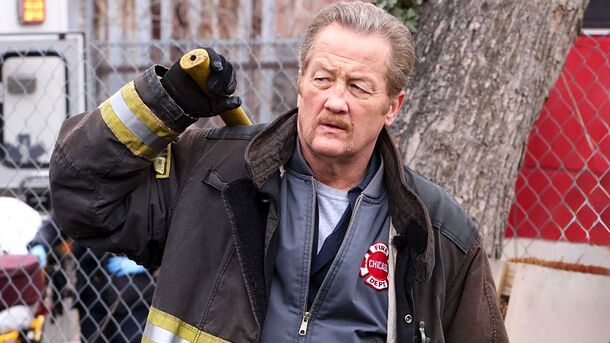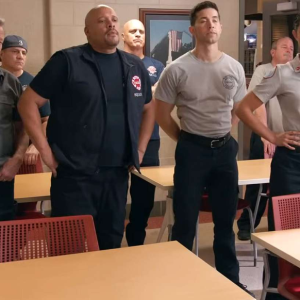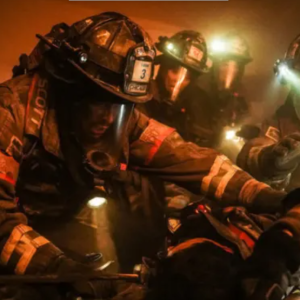When Mouch collapsed during the dramatic Chicago Fire Season 11 finale, fans held their breath. The beloved veteran, known for his humor, warmth, and loyalty, lay unconscious as alarms rang in the background. It was one of the most emotional cliffhangers in the series’ history, reminding viewers just how much Mouch meant to the soul of Firehouse 51.
Season 13 doesn’t sweep his survival under the rug. Instead, the writers lean into the gravity of the moment. Mouch’s heart scare isn’t just a brush with death—it becomes a turning point, reshaping his story in ways fans never expected.

Facing Mortality With Courage—and Sarcasm
Christian Stolte has always played Mouch as the house jokester, a man who uses humor as a shield. But this time, even his best punchlines can’t cover the doubt creeping in. For the first time, he openly questions if he still belongs on the front lines.
His struggle is raw. He hesitates during drills. He flinches at the sound of sirens. His once-unshakable confidence has cracked. Yet the show refuses to reduce him to fear alone. Instead, it paints him as a man learning that strength isn’t about pretending to be invincible—it’s about showing up, scars and all.
Brotherhood and Belief: 51 Has His Back
One of the season’s most heartfelt arcs comes from how the rest of Firehouse 51 rallies around him. Herrmann steps into the role of protector, often pushing back when Mouch is pressured too quickly. Cruz offers steady encouragement. Kidd adds tough-love support. Even Severide, who rarely opens up, reminds Mouch of his worth in a way only he can.
These moments highlight what Chicago Fire does best—showing the power of brotherhood. Strength doesn’t come from charging into flames alone. It comes from knowing someone is behind you, no matter what. Mouch, despite his doubts, embodies resi ience by leaning on his family in the firehouse.
ience by leaning on his family in the firehouse.
Adapting Instead of Retreating
The writers avoid a quick-fix recovery. Instead, they give Mouch space to redefine his role. He steps into mentorship, guiding younger recruits with patience and humor. He gets more involved in community outreach, showing the public how firefighting extends far beyond emergency calls.
At one point, he even considers early retirement. But his decision to stay isn’t about ego or denial. It’s about purpose. Mouch realizes he still has something vital to contribute, even if he spends less time inside burning buildings.
This evolution feels authentic. It’s one of the most honest portrayals of aging and vulnerability in a high-risk job the show has ever delivered.
Legacy, Loyalty, and Looking Forward
Mouch’s Season 13 arc isn’t just about recovery—it’s about legacy. He may not be the fastest or strongest firefighter in 51, but his heart has always been its foundation. Surviving a heart scare only reinforces that truth.
By the season’s final stretch, it’s clear that Mouch’s role has shifted. He’s less about pulling victims from fires and more about keeping his brothers and sisters grounded. His wisdom, humor, and loyalty carry just as much weight as a Halligan bar.
Still Here, Still Fighting
Mouch’s journey proves that heroes aren’t defined by their physical limits. They’re defined by their resilience, their love for the job, and their impact on others. He may not fight every fire the same way anymore, but his presence ensures that Firehouse 51 never loses its heart.
Mouch is still here. Still laughing. Still leading. And for fans, that’s the greatest victory of all.





